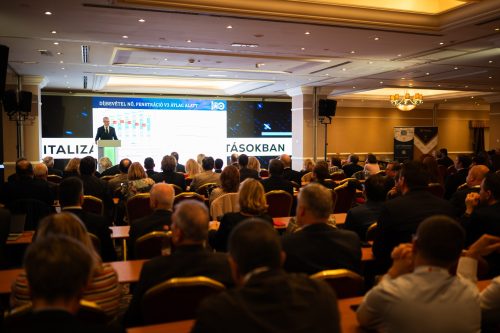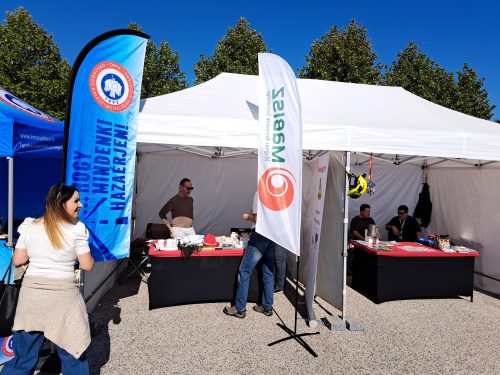Reelection at the Association of the Hungarian Insurance Companies (2025.03.12.)
On 12 March 2025, the Association of Hungarian Insurance Companies (MABISZ) elected a new eight-member Executive Committee following the expiry of the mandate of the previous Executive Committee.
Mihály Erdős, the current president of the Association, had previously announced that he would not stand for reelection. The members of the Executive Committee elected Bence Holló, the current Deputy Chairman and CEO of NN Biztosító Zrt. as President, and Peter Zatykó, the current CEO of Alfa Vienna Insurance Group Zrt. as the new Deputy Chairman.
“I would like to thank Mihály Erdős for his work at the head of the Association over the past decade and a half as Vice-Chairman and then President, a period of outstanding activity and success in the history of the Hungarian insurance sector. I thank the membership for their trust and support, and my goal is to focus on the challenges ahead in the coming years as President of the Association of Hungarian Insurance Companies,” said Bence Holló, Chairman and CEO of NN Biztosító Zrt. after the election.
Association of the Hungarian Insurance Companies
Increasing savings, new challenges in the field of digitalisation(2025.03.03.)
Efficient and effective professional cooperation has been established this year between the Association of Hungarian Insurance Companies and Hungarian insurers, which can be built upon in the future – this was said at the executive’s roundtable discussion of the XIV. International Insurance Conference of MABISZ (Assosication of Hungarian Insurance Companies). This year, the largest annual event of the Hungarian insurance sector was dedicated to the role of digitalisation and artificial intelligence in insurance.
As highlighted in its information, in 2024 the total premium income of MABISZ members will reach HUF 1 777 billion. This amount is 12.4 percent higher than the previous year, but in real terms it is roughly the same as in 2018. The number of policies managed by domestic insurers is close to 14 million, an indicator almost 400,000 more than in 2023. The drivers of growth were compulsory motor liability, pension and liability insurance. Unfortunately, the number of CASCO insurance contracts continues to decline, a fact linked to tax regulations and the ageing car population in the country, as the average age of the car population in 2024 was 16.1 years,” the MABISZ President pointed out.

Life insurance market
Last year, non-life premium income increased by 11.2% to HUF 1,077 billion, he continued. As he said, premium income in the life segment grew by 14.4% to HUF 700 billion. In 2024, premium income in the pension insurance segment grew by 15.3%, which means 523,000 insurance contracts, i.e. 30,000 contracts more on a year/year basis. The number of term insurance policies increased by 4.9% and unit-linked by 0.4%, while the number of mixed life insurance policies decreased by 11.6%. Premium income from personal property insurance increased by 14%, and KGFB policies also generated 13.6% more premiums in 2024, Mihály Erdős said.Although the president of MABISZ says that the term “claims expenditure” is unfortunate in the life insurance sector, the accepted professional definition is that the sector as a whole made 9.6% more claims payments than in the previous year. The life area saw an increase of 3.9%, while the non-life area grew by 16.1%, Mihály Erdős summarised.
Housing insurance and the property market
As far as the housing insurance market is concerned, the MABISZ President stressed that during the last campaign, the number of contracts, according to members’ data, remained practically unchanged, and in fact, on a year/year basis, the number decreased by 1152 contracts. However, there was a visible increase in the stock premium and the average premium: if the MFO (Certified Customer-friendly Home Insurance) indicator is taken into account, the increase was 12.6%, while without the MFO(Certified Customer-friendly Home Insurance) indicator, the increase was 13.3%. This increase is in line with the increase in the construction price index, which was 15.9% and is the benchmark for indexation. According to Mihály Erdős, last year’s campaign contributed to the near doubling of the MFO(Certified Customer-friendly Home Insurance) index, which now accounts for 2.7% of the total stock of 3.3 million.As President of MABISZ, he reminded that the Association of Hungarian Insurance Companies considers it of the utmost importance that during the campaign all customers who cancel their home insurance should take out a new policy and not be left without cover. And when choosing an insurer, the Association recommends that customers should review not only the price but also the content of the services. In this year’s housing campaign, the Association is particularly calling on customers to ensure that when installing new technologies or, where appropriate, increasing the floor area, homeowners also provide adequate cover for these new risks. It is also important to take account of the price rises in the property market when updating contracts.

Liability insurance policy
The President of MABISZ drew attention to the issue of contractors’ liability insurance, which currently affects around 108,000 construction contractors. All domestic construction or design companies and sole traders must have compulsory contractors’ liability insurance. According to a survey by MABISZ, based on the volume of insurance policies taken out by its member insurers, they have already achieved almost 100% coverage in this area, thanks to the efforts of, among others, insurance professionals and insurance intermediaries.
Extra profit tax
Last year, the Hungarian insurance sector paid HUF 240 billion to the budget in the form of insurance and extra profit tax, 13.52% of their premium income and HUF 27 billion more than the amount of tax the sector will pay in 2023. According to Mihály Erdős, MABISZ was pleased to note that, by accepting the Association’s proposals, the extra profit tax could be reduced in 2025 in line with the government’s decision to reduce the extra profit tax in a similar but proportionally larger way to the banking sector.In the case of buying government bonds, the extra profit tax can be reduced by 30 percent of the purchase price. This amount can be reduced up to 100% for life insurance and up to 40% for non-life insurance. The Association of Hungarian Insurance Companies’s forecasts that the expected tax burden on the sector from insurance tax and extra profit tax this year will be around HUF 216 billion, or 11% of the sector’s expected premium income, taking advantage of the possibility to buy government securities this year.
Ethical life 2.0 EU Regulation
MABISZ is proactively preparing for the introduction of the Ethical Life 2.0 regulation, which will partially come into force on 1 July, with the aim of increasing consumer confidence in investment products. I am personally convinced that with the transposition of the Ethical Life 2.0 EU regulation, the Hungarian life insurance sector will become one of the most regulated and transparent sectors of the Hungarian economy,” said Mihály Erdős at the annual press conference of the MABISZ President.
Association of the Hungarian Insurance Companies











